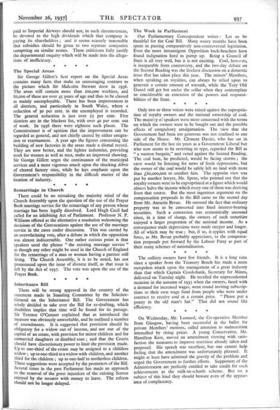Only two or three voices were raised against the expropria-
tion of royalty owners and the national ownership of coal. The majority of speakers were more concerned with the terms on which the owners were to be bought out and the possible effects of compulsory amalgamation. The view that the Government had been too generous was not confined to one side of the House. Mr. Clement Davies, who has sat in Parliament for the last six years as a Government Liberal but who now seems to be reverting to type, regarded the Bill as " a wanton bargain," and voted against the Second Reading. The coal boat, he predicted, would be facing storms ; the crew would be listening for news of fresh depressions, but the owner of the coal would be safely left on land with more than L60,000,000 to comfort him. The opposite view was put by another lawyer, Mr. Spens, who pointed out that the royalty owners were to be expropriated at a figure which would almost halve the income which every one of them was deriving from that source. But the most ingenious argument on the compensation proposals in the Bill came on the second day from Mr. Aneurin Bevan. He stressed the fact that ordinary property was to be converted into fixed interest-bearing securities. Such a conversion was economically unsound since, in a time of slump, the owners of such securities enjoyed a larger proportion of the national income. As a consequence trade depressions were made steeper and longer. All of which may be true ; but, if so, it applies with equal force, as Mr. Bevan probably appreciates, to the compensa- tion proposals put forward by the Labour Party as part of their many schemes of nationalisation.
* * * *














































 Previous page
Previous page